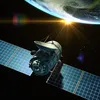ISRO's PSLV accomplishes zero orbital debris mission
This was achieved on March 21, when the PSLV Orbital Experimental Module-3 met its fiery end through a re-entry into the Earth's atmosphere.
Indian Space Research Organisation's (ISRO) Polar Satellite Launch Vehicle (PSLV) has accomplished zero orbital debris mission.
The space agency described it as "another milestone".
This was achieved on March 21, when the PSLV Orbital Experimental Module-3 (POEM-3) met its "fiery end" through a re-entry into the Earth's atmosphere.
"The PSLV-C58/XPoSat mission has practically left zero debris in orbit," ISRO said.
The PSLV-C58 mission was accomplished on January 1.
According to ISRO, after completing the primary mission of injecting all satellites into their desired orbits, the terminal stage of PSLV was transformed into a 3-axis stabilised platform, the POEM-3.
The stage was deorbited from 650 km to 350 km, which facilitated its early re-entry, and was passivated to remove residual propellants to minimise any accidental break-up risks, it said.
POEM-3 was configured with a total of nine different experimental payloads to carry out technology demonstrations and scientific experiments on the newly developed indigenous systems. Out of these, six payloads were delivered by non-government entities through Indian National Space Promotion and Authorization Centre (IN-SPACe).
The mission objectives of these payloads were met in a month.
The orbital altitude of the upper stage continued to decay under the influence of natural forces, primarily atmospheric drag with the module (NORAD ID 58695) expected to have impacted the North Pacific Ocean (Lat 6.4 N & Long 158.7 W) on March 21, 2024, at 14:04 UTC (19:34 Hrs. IST), ISRO said.
Through the POEM, which serves as a very cost-effective platform for carrying out short-duration space-borne experiments, ISRO has opened up new vistas for academia, startups, and non-government entities to experiment with their new payloads, it said.
This novel opportunity has been effectively utilised by numerous startups, universities, and NGEs for carrying out experiments in space, which included electric thrusters, satellite dispensers, and star-tracking.
POEM also incorporates new features such as total avionics in single-chain configuration, industrial-grade components in avionics packages including Mission Management Computer, standard interfaces for electric power, telemetry and telecommand, and new in-orbit navigation algorithms making use of rate-gyro, sun sensor, and magnetometer, the space agency said.
For the effective conduct of experiments onboard in POEM-3, the body rates were stabilised to less than 0.5 deg/s throughout, and innovative schemes like controlled dumping of residual propellant after the main mission were introduced for minimising disturbances due to passivation, it added.
Noting that the Vikram Sarabhai Space Centre (VSSC) has taken the lead in conceptualising and realising the POEM by augmenting the 4th stage of PSLV, ISRO said PSLV-C58/XPoSat is the third such mission in the series, with POEMs being successfully scripted each time.
The payload operations were carried out effectively by the spacecraft operations team from the mission operations complex at ISRO Telemetry Tracking and Command Network (ISTRAC), and ISRO's System for Safe and Sustainable Spacecraft Operations Management has been monitoring and analysing the orbital decay all through, it said.
Till near re-entry, POEM-3 was tracked by ISTRAC ground stations.
The multi-object tracking radar at Sriharikota also tracked the PS4 stage till the morning of March 21. POEM-3 was also supported by other centres such as teh U R Rao Satellite Centre, Liquid Propulsion Systems Centre, and ISRO Inertial Systems Unit.
ISRO said it will continue its commitment to providing a cost-effective orbital experiment platform, as the growing menace due to space debris, especially with multiple small satellite constellations coming up, poses a significant threat to space activities, including satellite launches, human spaceflight, and space exploration missions.
ISRO, being a responsible space agency, is committed to mitigating this threat through the development and implementation of advanced debris tracking systems, space-object deorbiting technologies, and responsible satellite deployment practices, thus safeguarding orbital environments for present and future space endeavours, it added.
Edited by Swetha Kannan








